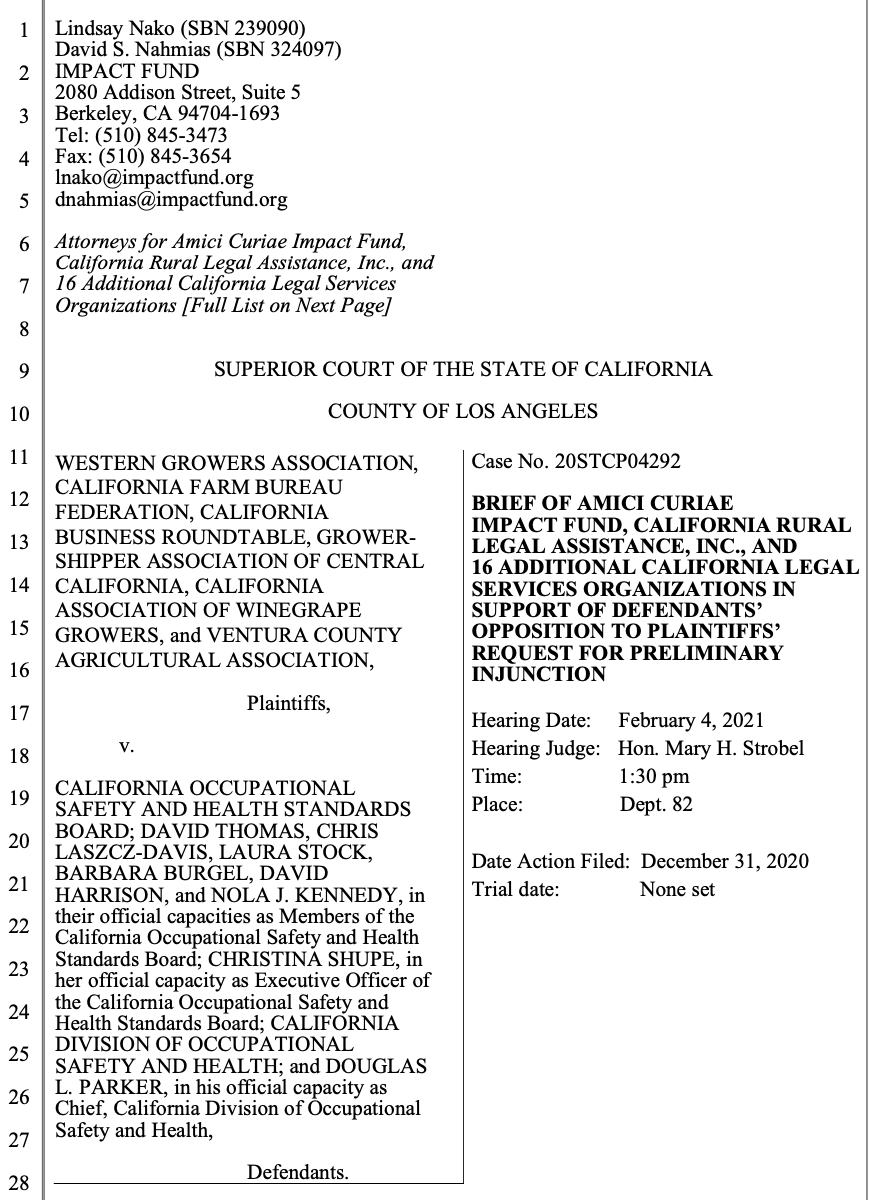Impact Fund & Amici Support State Efforts to Protect Vulnerable Workers During Deadly Pandemic
Drea Núñez, Law Fellow
As the COVID-19 pandemic rages on and the number of infected Californians skyrockets, it is imperative that employees are protected at work. Yet California’s effort to establish Emergency Temporary Standards that provide baseline worksite protections has come under attack in two lawsuits filed by employer groups, led by the National Retail Federation and Western Growers Association. This week, the Impact Fund and a coalition of 17 other California legal services organizations filed amicus briefs in both the National Retail Federation case and the Western Growers Association case to defend the Emergency Temporary Standards, protect workers, and fight to prevent new COVID-19 outbreaks in the workplace.
As of today, almost 3 million Californians have been infected by COVID-19 and workers need protection.
With 2.9 million Californians infected by COVID-19 and over 31,000 deaths in the state, the need to keep workers safe cannot be overstated. Before California’s Occupational Safety and Health Standards Board established the Emergency Temporary Standards in November 2020, the only workplace standards preventing airborne virus transmission were in medical and nursing settings. The Emergency Temporary Standards were urgently needed to protect all workers. They were adopted after a thorough review of scientific publications and public health recommendations and reflect the primary way that the virus spreads: airborne transmission. The Standards mandate social distancing, adequate ventilation of indoor spaces, and use of face masks. They also require that workplaces with 3+ infections in a short period of time provide no-cost testing to exposed workers and continue issuing pay and benefits to employees quarantining at home. The Standards implement similar protections for employer-provided housing and transportation to reduce the transmission of COVID-19 in high-risk communal spaces.
Employer groups filed suit in late December 2020, arguing that the COVID-19 pandemic was not sufficient to trigger emergency rulemaking proceedings. They also railed against the Standards, particularly the requirements that employers provide testing for employees and continued pay and benefits for employees isolating at home. Western Growers Association and agricultural employers additionally attacked protections required in employer-provided housing and transportation. They believe these worker protections are too onerous and costly and have asked the court to nullify the Emergency Temporary Standards.
Our coalition addressed two seemingly obvious realities: (1) the COVID-19 pandemic is an emergency that warrants immediate action to avoid serious harm to the public health and general welfare, and (2) the Emergency Temporary Standards are necessary to protect the health of vulnerable low-wage workers. Our amicus briefs explored the record prepared by the Standards Board, which conclusively demonstrated that COVID-19 is a threat to human life and documented how it continues to spread in workplaces. The information gathered by the Standards Board detailed how COVID-19 can ravage the body, too often resulting in hospitalization, prolonged symptoms, and even death. This and other evidence—such as Governor Newsom’s Statement of Emergency and public stay-at-home orders—confirmed that the COVID-19 pandemic is indeed a state-wide emergency demanding immediate and definitive action. Our briefs then described the Standards and demonstrated their clear link to well-accepted public health recommendations.
The Standards fulfill the Division’s mandate to protect all workers, including agricultural workers and those in the service, retail, and transportation industries who are most vulnerable to COVID-19. These low-wage workers—too often Black, Asian, and Latinx workers—have found themselves more often called back to worksites in front-line essential jobs that lack adequate protections.
The California Department of Industrial Relations, Division of Occupational Safety and Health has a duty to keep California workers safe. Our amicus briefs make clear that the state fulfilled its duty in this instance. The Emergency Temporary Standards provide basic, necessary workplace protections for all workers and serve as an important step toward mitigating the health, income, and racial inequities caused by the COVID-19 pandemic.
We are grateful to join with our fellow amici to support worker safety over corporate profit:
California Rural Legal Assistance, Inc.
Asian Americans Advancing Justice | Los Angeles
California Rural Legal Assistance Foundation
Disability Rights Education & Defense Fund
Labor & Employment Committee of the National Lawyers Guild
Lawyers’ Committee for Civil Rights of the San Francisco Bay Area
Legal Services of Northern California
National Employment Law Project
San Diego Volunteer Lawyer Program
Western Center on Law & Poverty
Update: 06.21.21
On February 25, 2021, the San Francisco Superior Court ruled against the Western Growers Association and the National Retail Federation and denied their request for a preliminary injunction, which kept the emergency standards in place. Western Growers Association (though not the National Retail Federation) appealed the trial court’s decision. On June 17, 2021, the Impact Fund filed an amicus brief in the First Appellate District, urging the court to affirm the decision and uphold the regulations. We again detailed the robust factual record that buttressed the Standards Board’s Finding of Emergency. In addition to the amici that joined our trial court brief, two additional amici—Occupational Safety & Health Law Project and Public Counsel—joined our new brief in the court of appeal.
Update 12.21.21
The California Court of Appeal, First Appellate District in San Francisco dismissed the bid to block the November 2020 rule. The three-judge panel said Cal/OSHA had provided adequate reasons for requiring employers to implement various safety measures, record and report illnesses and continue to pay workers who have been quarantined.




